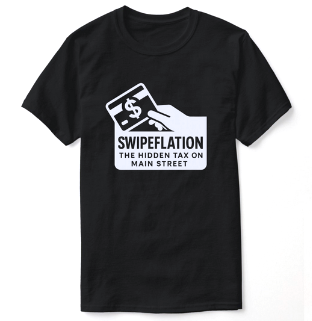
The hidden tax on main street
Credit card swipe fees
are adding to the inflationary pain felt by small businesses and consumers alike—leading to a rise in cash payment requests.
Real Stories from Main Street: Swipe Fees Impact
“Swipe fees have cut deeply into our profits, forcing us to raise prices just to stay afloat. It’s a constant struggle to keep serving our community.”
Maria Lopez
Owner, Lopez Family Bakery


The Problem
Consumers are ultimate victims
More businesses now charge their customers fees when they pay using a credit card or offer discounts when they use cash. A WalletHub survey recently
found that 80% of consumers report paying these credit card surcharges in the last year.
Businesses not benefitting
Shop owners and restaurateurs are not trying to nickel-and-dime customers with these fees; they’re just trying to entice customers to use lower-cost forms of payment like cash or debit.
High cost for small businesses
Small businesses have to pay swipe fees when you use your credit card. Every time you swipe a card, 2–4% of the sale goes straight to big banks and card networks like Visa and Mastercard.
Problem increasing
Swipe fees totaled a record $180 billion last year. That’s more than $1,400 per household, up 70% since before the pandemic. Swipeflation is real.
Compounds inflation
This is on top of years of rising prices due to inflation. Rising costs for everything from labor to supplies to rent and utilities have squeezed the margins of small businesses because they have less capacity to absorb inflation than larger companies.
Swipe Fees Hurt Small Businesses
Thin margins destroyed
After years of inflation, many small businesses have seen their margins narrow. For many small businesses, like restaurants and retailers, swipe fees often equal or exceed their entire profit margin on a sale.
Tough choices
Small shops must either cut wages and hours or raise prices, making it harder to compete.
No leverage to negotiate
Unlike some big businesses, small businesses can't negotiate for lower rates with credit card companies.
Who Wins?
Credit card companies pocket a cut of every transaction, whether you’re a corner café or a Fortune 500 retailer.
Inflation is their windfall. Example: A meal at the local burger joint that cost $6 in 2019 now costs $8.40—an increase of 40%! Families pay more, and card companies get 40% more since they take a percentage of every sale, without doing anything extra.

Paying with cash helps you support your favorite local small businesses by helping them keep their prices lower.
Swipe fees are a hidden tax that strangles Main Street and inflates prices for every household in America.
Partner Organizations
2-4% swipe fee rate charged on every credit card transaction
Swipe fees: the cost burden on small businesses and consumers.
Impact on Small Businesses
Small businesses pay billions annually in swipe fees, reducing profit margins and limiting growth opportunities.
Consumer Consequences
Consumers indirectly bear these fees through higher prices, with a record $180 billion passed on last year alone.
News
Questions? Contact us here.
Thank you for contacting us. We will get back to you as soon as possible.
Oops, there was an error sending your message. Please try again later.

Resources
Subscribe
Thank you for contacting us. We'll keep you posted about efforts to support businesses by curbing high swipe fees!
Oops, there was an error sending your message. Please try again later.


